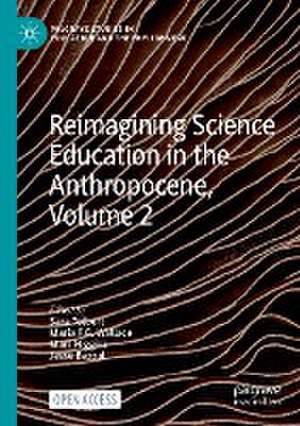Reimagining Science Education in the Anthropocene, Volume 2: Palgrave Studies in Education and the Environment
Editat de Sara Tolbert, Maria F.G. Wallace, Marc Higgins, Jesse Bazzulen Limba Engleză Paperback – 30 noi 2023
| Toate formatele și edițiile | Preț | Express |
|---|---|---|
| Paperback (1) | 359.54 lei 6-8 săpt. | |
| Springer International Publishing – 30 noi 2023 | 359.54 lei 6-8 săpt. | |
| Hardback (1) | 432.51 lei 6-8 săpt. | |
| Springer International Publishing – 30 noi 2023 | 432.51 lei 6-8 săpt. |
Preț: 359.54 lei
Nou
Puncte Express: 539
Preț estimativ în valută:
68.81€ • 71.29$ • 57.42£
68.81€ • 71.29$ • 57.42£
Carte tipărită la comandă
Livrare economică 21 martie-04 aprilie
Preluare comenzi: 021 569.72.76
Specificații
ISBN-13: 9783031354328
ISBN-10: 303135432X
Pagini: 421
Ilustrații: XIX, 421 p. 10 illus., 6 illus. in color.
Dimensiuni: 148 x 210 mm
Greutate: 0.53 kg
Ediția:1st ed. 2024
Editura: Springer International Publishing
Colecția Palgrave Macmillan
Seria Palgrave Studies in Education and the Environment
Locul publicării:Cham, Switzerland
ISBN-10: 303135432X
Pagini: 421
Ilustrații: XIX, 421 p. 10 illus., 6 illus. in color.
Dimensiuni: 148 x 210 mm
Greutate: 0.53 kg
Ediția:1st ed. 2024
Editura: Springer International Publishing
Colecția Palgrave Macmillan
Seria Palgrave Studies in Education and the Environment
Locul publicării:Cham, Switzerland
Cuprins
Chapter 1 Introduction: To Be More Relevant the Field of Science Education Needs to Be Less Relevant.- Part I Kinship, Magic, and the Unthinkable.- Chapter 2 Re-thinking Science Education for the Anthropocene.- Chapter 3 What Future Do Young Mozambicans Envision in a Time of Humanitarian and Environmental Crisis?.- Chapter 4 How a Phenomenology of Place in Science Education Can Grant Erotic Generosities for the Ocean.- Chapter 5 The Ghost of Laplace’s Demon: Revisiting the Anthropocene.- Part II Anti-colonial Anthropocene(s).- Chapter 6 Envisioning Non-elite and More-than-Colonial Environmentalisms.- Chapter 7 Indigenous Spiritual Geographies: Rosalie Little Thunder and "What Does It Mean to Be a Good Relative?".- Chapter 8 The Social Focus Framework: Antiracist and Anticolonial Conscientization, Consequence, and Presencing in Science Education.- Chapter 9 Breaking the Paradigm: Storying Climate Change.- Part III Politics and Political Reverberations.- Chapter 10 From False Generosity to True Generosity: Theorizing a Critical Imaginary for Science Education.- Chapter 11 Anti-racist Praxis in (Science and) Education.- Chapter 12 Science Education: From an Ideology of Greed to an Ideology of Thriving.- Chapter 13 Practices of Care with the Anthropocene: Scenes from the 2019 Nebraska Flood.- Part IV Science Education for a World Yet to Come.- Chapter 14 Science Fiction, Speculative Pedagogy, and Critical Hope: Counternarratives for/of the Future.- Chapter 15 Curriculum Beyond Apocalypse.- Chapter 16 Let’s Root for Each Other and Grow: Interconnectedness (with)in Science Education.- Chapter 17 Perturbing Current Boundary Conditions in Discipline-Based and Science Education Research in the Anthropocene: Implications for Research and Teaching Communities.- Part V Complicated Conversations.- Chapter 18 In Conversation with SharonTodd: Rethinking the Future in a Time of Sorrow.- Chapter 19 In Conversation with Max Liboiron: Towards an Everyday, Anticolonial Feminist Science (Education) Practice.- Chapter 20 In Conversation with Isabelle Stengers: Ontological Politics in Catastrophic Times.- Chapter 21 In Conversation with Steven Khan: Sensible and Sense-able Qualitative Literacies for Multi-species Flourishing.- Conclusion Amplifying Science Education Research with(in) a Minor Key.
Notă biografică
Sara Tolbert is Associate Professor of Science and Environmental Education at Te Whare Wānanga o Waitaha University of Canterbury, Aotearoa New Zealand.
Maria F.G. Wallace is Assistant Professor of Science Education in the Center for STEM Education at the University of Southern Mississippi, USA.
Marc Higgins is Associate Professor in the Department of Secondary Education at the University of Alberta, Canada, where he is affiliated with the Faculty of Education’s Aboriginal Teacher Education Program (ATEP).
Jesse Bazzul is Associate Professor of Science and Environmental Education at the University of Regina, Canada.
Maria F.G. Wallace is Assistant Professor of Science Education in the Center for STEM Education at the University of Southern Mississippi, USA.
Marc Higgins is Associate Professor in the Department of Secondary Education at the University of Alberta, Canada, where he is affiliated with the Faculty of Education’s Aboriginal Teacher Education Program (ATEP).
Jesse Bazzul is Associate Professor of Science and Environmental Education at the University of Regina, Canada.
Textul de pe ultima copertă
This volume, a follow up to Reimagining Science Education in the Anthropocene (2021), continues a transdisciplinary conversation around reconceptualizing science education in the era of the Anthropocene. Drawing educators from many walks of life and areas of practice together in a creative work that helps reorient science education toward the problems and peculiarities associated with this contemporary geologic time. This work continues the mission of transforming the ways communities inherit science and technology education: its knowledges, practices, policies, and ways-of-living-with-Nature. Our understanding of the Anthropocene is necessarily open and pluralistic, as different beings on our planet experience this time of crisis in different ways. This second volume continues to nurture productive relationships between science education and fields such as science studies, environmental studies, philosophy, the natural sciences, Indigenous studies, and critical theory in orderto provoke a science education that actively seeks to remake our shared ecological and social spaces in the coming decades and centuries.
This is an open access book.
Caracteristici
Global perspectives on challenges of the Anthropocene era Explores beyond the scope of mainstream science education Divergent thinking in science education, melding theory with practice This book is open access. You have free and unlimited access









